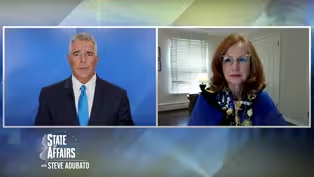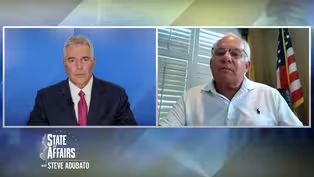State of Affairs with Steve Adubato
Newark Superintendent Talks About Learning Loss From COVID
Clip: Season 7 Episode 12 | 9m 23sVideo has Closed Captions
Newark Superintendent Talks About Learning Loss From COVID
Superintendent of Newark Public Schools Roger León joins Steve Adubato to discuss the ways the pandemic impacted learning loss and the goals for Newark Public Schools' mandatory summer school program.
Problems playing video? | Closed Captioning Feedback
Problems playing video? | Closed Captioning Feedback
State of Affairs with Steve Adubato is a local public television program presented by NJ PBS
State of Affairs with Steve Adubato
Newark Superintendent Talks About Learning Loss From COVID
Clip: Season 7 Episode 12 | 9m 23sVideo has Closed Captions
Superintendent of Newark Public Schools Roger León joins Steve Adubato to discuss the ways the pandemic impacted learning loss and the goals for Newark Public Schools' mandatory summer school program.
Problems playing video? | Closed Captioning Feedback
How to Watch State of Affairs with Steve Adubato
State of Affairs with Steve Adubato is available to stream on pbs.org and the free PBS App, available on iPhone, Apple TV, Android TV, Android smartphones, Amazon Fire TV, Amazon Fire Tablet, Roku, Samsung Smart TV, and Vizio.
Providing Support for PBS.org
Learn Moreabout PBS online sponsorship[INSPRATIONAL MUSIC STING] - We're now joined by Roger León, who is the superintendent of Newark Public Schools.
Superintendent, good to have you with us.
- Thank you for having me.
- We are actually doing this at the end of the school year, the end of June, 2023.
Number one lesson that you have learned in this year where unmasking has taken place and we're further away from COVID than ever.
Biggest lesson that you've learned as the leader of the school system?
- Oh my goodness.
There are a number of important lessons that have obviously been learned.
The urgency of the moment has just been reaffirmed.
There's a lot of work that needs to be done to challenge our students to move the work, and that just continues to be a reality today.
- Talk about learning loss, I mean, there's a lot of rhetoric around it, but what's the reality of the degree to which students in the Newark public schools have lost in terms of where they should be, where they need to be, grade-wise, academically, please, Superintendent?
- Yes, we put things into perspective.
So today's reality, you take a senior in high school, their last normal schooling, with the exception of their return back last year, was in eighth grade.
So the disruption to their freshman year, their high schooling, has been unlike any other graduating class ever, not having its full compliment, learning from home a good portion of almost 50% of their high school years.
The national trends are happening here in Newark as well where we see older students impacted a little less than our younger students.
That English language arts is the area where growth is demonstrated far quicker than in math.
So the disruption for a good year and a half to schooling has had a significant impact that we're still realizing today, even though there are signs of hope that clearly show that we're moving in the right direction.
- Superintendent, and by the way, the math piece, I just wanna mention this 'cause I wanna talk to you about social and emotional issues as well.
Standardized tests, which there's a whole range of discussion about that, debate about it as well.
6.8% of Newark students scored at grade level in math compared to 24% statewide.
Explain to folks what some of the primary reasons for that would be.
- Well, we first look at what are we comparing?
So we're comparing scores from 2019, which is pre-pandemic.
No one was even thinking about the amount of learning from home, the impact on social, emotional learning needs of students, regardless of whatever school type that they were attending.
And then the impact of the assessment that actually was administered last school year.
So the majority of those students were not even in school or at least 62% of our students were just returning back to school last school year.
We had 38% of our students that actually returned in April of 2022.
So while we do a lot of analysis, we're looking at students who have been with us during those entire two different time periods, students that have been with us during the entire duration of the actual pandemic.
So when we do all of these comparisons, we see students who are with us the longest actually did far better than students who were just coming into our school system, meaning that the impact of the response to the pandemic did differ from school types outside of the city of Newark.
So when you're comparing those two time periods it's convenient to forget what actually has in fact happened.
The inequities that did exist.
The issues that we needed to address that were quite profound, like making sure the students had technology at home.
- I was just gonna say technology, which is an economic issue for many.
- Well, technology is just one aspect of it.
'Cause there's actually having the hardware, but if you don't have wifi access it doesn't matter how many computers you actually have in your household.
So making sure that students actually had that as well.
And then just given the way that the city is organized, we had a number of students, over 2,500, that we issued hotspots for because not only technology, but the wifi access was just not accessible to them.
So that's one aspect of it.
One of the things that I think I previously shared was that there are 8 million meals that we distributed during the height of the pandemic.
So food inequities that were also impacting our students.
And I would also wanna highlight that while many people had the luxury of working from home, many of our parents were the first responders, were essential workers and they're the ones who actually made everyone's reality of working from home more of a reality.
So we had several issues at like, and I'm not talking about any excuses, I'm just saying that to understand the magnitude of what we are addressing, you need to actually not forget any of the factors that actually got us to where we are right now.
- Got a couple things, I'm gonna ask about teachers and summer school in a second, but I also wanna disclose that in collaboration with Newark Public Schools, we're doing a series of Powering Equity and Social Justice, part of our Stand and Deliver series.
Superintendent, summer school.
Is it mandatory for certain students in Newark right now?
- Absolutely.
So we have a cohort of students at the elementary level where summer school is mandatory.
We're gonna intensify during the month of July and August, accentuate some of the work that we were doing during the course of this year and really focus on literacy and mathematics skills for the next two months.
- Got it.
- That's just one aspect of it, I didn't want everyone to think that our summer program, so we call it summer program.
There are basically three components to it.
The intensified mandatory program for elementary students, the accelerated programming that we're affording students that are in our high schools, and then just a lot of fun activities whether it's during the day or way into the evening, opportunities that we've increased for students of all grades.
- Got it, Superintendent, to what degree is there a significant teacher shortage in the public schools in Newark?
- Well, the national teacher shortage is real.
One of the realities that impacted us in Newark was the creation of new positions because there are two trends that are occurring nationally that we are experiencing its impacts but not as profoundly.
The teacher shortage and enrollment.
Our enrollment has increased incredibly, way close to about 40,000 students over the course of the last eight years or so with about 35,000 being our lowest in around 2013, 14.
So our enrollment is going up which means we had to create new positions.
So over the course of the summer our creative strategies as well as what we call the NTU Reopener were essential towards addressing the 700 teachers that we needed to hire, and did so over the course of this past summer.
So we've had about 60 or so vacancies that we've carried for the year.
- A daunting responsibility.
That's the Superintendent of the Newark Public Schools, Roger León.
Superintendent, thank you so much for joining us.
We appreciate it.
- Thank you for having us.
I appreciate you.
- You got it.
Stay with us.
We'll be right back.
- [Narrator] State of Affairs with Steve Adubato Is a production of the Caucus Educational Corporation.
Funding has been provided by Holy Name.
The Turrell Fund, supporting Reimagine Childcare.
New Jersey Sharing Network.
Horizon Blue Cross Blue Shield of New Jersey.
PSEG Foundation.
Operating Engineers, Local 825.
New Brunswick Development Corporation.
The New Jersey Economic Development Authority.
NJM Insurance Group.
And by these public spirited organizations, individuals and associations committed to informing New Jersey citizens about the important issues facing the Garden State.
And by Employers Association of New Jersey.
Promotional support provided by Northjersey.com and Local IQ.
And by Insider NJ.
- I am alive today thanks to my kidney donor.
I am traveling and more active than ever before.
- I'm alive today thanks to my heart donor.
I'm full of energy and back singing in my church choir.
- I'm alive today thanks to my lung donor.
I'm breathing easy and I'm enjoying life'’s precious moments.
- They are about 4,000 people in New Jersey waiting for a life-saving transplant.
- Donation needs diversity!
- For more information or to become an organ and tissue donor, visit NJSharingNetwork.org.
Asw. Muñoz Addresses the Nursing & Physician Shortage
Video has Closed Captions
Clip: S7 Ep12 | 9m 30s | Asw. Muñoz Addresses the Nursing & Physician Shortage (9m 30s)
Former Senator Talks About the Need for a Third Party
Video has Closed Captions
Clip: S7 Ep12 | 9m 2s | Former Senator Talks About the Need for a Third Party (9m 2s)
Providing Support for PBS.org
Learn Moreabout PBS online sponsorship
- News and Public Affairs

Top journalists deliver compelling original analysis of the hour's headlines.

- News and Public Affairs

FRONTLINE is investigative journalism that questions, explains and changes our world.












Support for PBS provided by:
State of Affairs with Steve Adubato is a local public television program presented by NJ PBS

